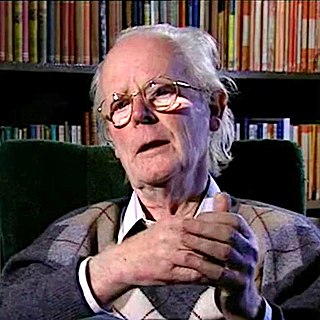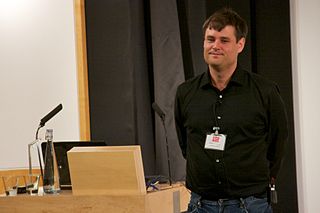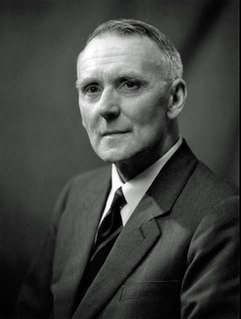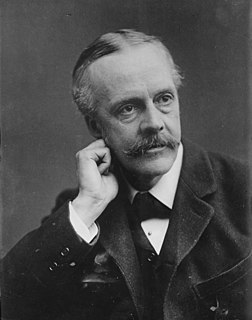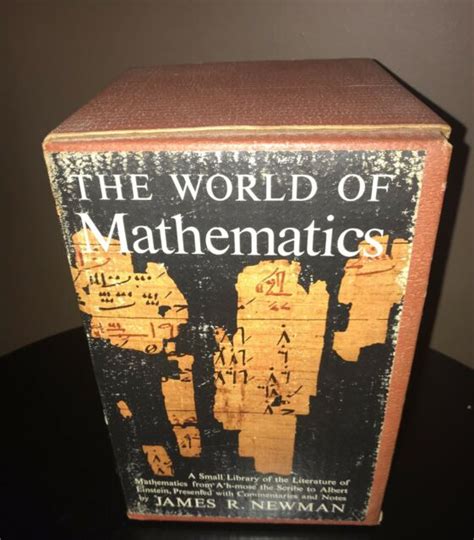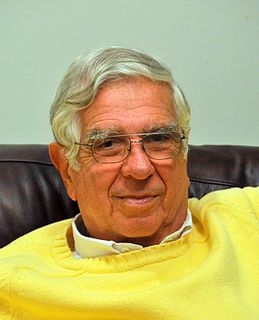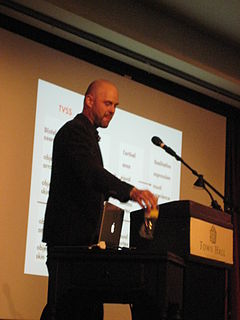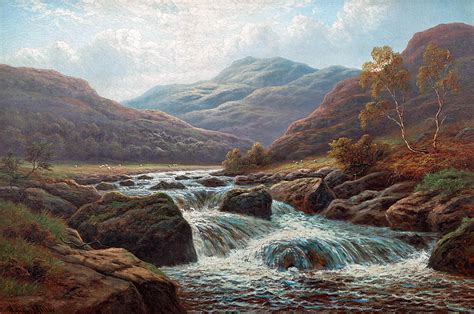Top 1200 Mathematics And Science Quotes & Sayings - Page 9
Explore popular Mathematics And Science quotes.
Last updated on December 12, 2024.
This example illustrates the differences in the effects which may be produced by research in pure or applied science. A research on the lines of applied science would doubtless have led to improvement and development of the older methods - the research in pure science has given us an entirely new and much more powerful method. In fact, research in applied science leads to reforms, research in pure science leads to revolutions, and revolutions, whether political or industrial, are exceedingly profitable things if you are on the winning side.
Being a philosophical naturalist does not mean that one thinks that science can provide all of the answers. That is scientism and that is wrong. I don't think a billion buckets of science could speak to the problems raised by the Tea Party. Being a philosophical naturalist does not mean that one thinks that the only truths are those of science. I think the claim just made in the last sentence is true but I don't think it is a claim of science. It means that you use science where you can and you respect and try to emulate its standards.
The progress of science is tremendously disorderly, and the motivations that lead to this progress are tremendously varied, and the reasons why scientists go into science, the personal motivations, are tremendously varied. I have said ... that science is a haven for freaks, that people go into science because they are misfits, and that it is a sheltered place where they can spin their own yarn and have recognition, be tolerated and happy, and have approval for it.
The term "informatics" was first defined by Saul Gorn of University of Pennsylvania in 1983 (Gorn, 1983) as computer science plus information science used in conjunction with the name of a discipline such as business administration or biology. It denotes an application of computer science and information science to the management and processing of data, information and knowledge in the named discipline.
Science is intimately integrated with the whole social structure and cultural tradition. They mutually support one other-only in certain types of society can science flourish, and conversely without a continuous and healthy development and application of science such a society cannot function properly.
I have a true aversion to teaching. The perennial business of a professor of mathematics is only to teach the ABC of his science; most of the few pupils who go a step further, and usually to keep the metaphor, remain in the process of gathering information, become only Halbwisser [one who has superficial knowledge of the subject], for the rarer talents do not want to have themselves educated by lecture courses, but train themselves. And with this thankless work the professor loses his precious time.
My science teachers always encouraged their classes to 'go out and discover something' because all scientific endeavors depend on observation and experimentation. Through such pursuits, anyone can find something new to science, and if it's truly novel, the entire edifice of science might have to be restructured.
A great swindle of our time is the assumption that science has made religion obsolete. All science has damaged is the story of Adam and Eve and the story of Jonah and the Whale. Everything else holds up pretty well, particularly lessons about fairness and gentleness. People who find those lessons irrelevant in the twentieth century are simply using science as an excuse for greed and harshness. Science has nothing to do with it, friends.
The necessary precondition for the birth of science as we know it is, it would seem, the diffusion through society of the belief that the universe is both rational and contingent. Such a belief is the presupposition of modern science and cannot by any conceivable argument be a product of science. One has to ask: Upon what is this belief founded?
There was, I think, a feeling that the best science was that done in the simplest way. In experimental work, as in mathematics, there was "style" and a result obtained with simple equipment was more elegant than one obtained with complicated apparatus, just as a mathematical proof derived neatly was better than one involving laborious calculations. Rutherford's first disintegration experiment, and Chadwick's discovery of the neutron had a "style" that is different from that of experiments made with giant accelerators.
The end of the eighteenth and the commencement of the nineteenth century are remarkable for the small amount of scientific movement going on in this country, especially in its more exact departments. Mathematics were at the last gasp, and astronomy nearly so; I mean in those members of its frame which depend upon precise measurement and systematic calculation. The chilling torpor of routine had begun to spread itself over all those branches of Science which wanted the excitement of experimental research.
Economics is a theoretical science and as such abstains from any judgement of value. It is not its task to tell people what ends they should aim at. It is a science of the means to be applied for attainment of ends chosen, not, to be sure, a science of the choosing of ends. Ultimate decisions, the valuations and the choosing of ends, are beyond the scope of any science. Science never tells a man how he should act; it merely shows how a man must act if he wants to attain definite ends.
Mathematical economics is old enough to be respectable, but not all economists respect it. It has powerful supporters and impressive testimonials, yet many capable economists deny that mathematics, except as a shorthand or expository device, can be applied to economic reasoning. There have even been rumors that mathematics is used in economics (and in other social sciences) either for the deliberate purpose of mystification or to confer dignity upon common places as French was once used in diplomatic communications.
Though determinants and matrices received a great deal of attention in the nineteenth century and thousands of papers were written on these subjects, they do not constitute great innovations in mathematics.... Neither determinants nor matrices have influenced deeply the course of mathematics despite their utility as compact expressions and despite the suggestiveness of matrices as concrete groups for the discernment of general theorems of group theory.
All those formal systems, in mathematics and physics and the philosophy of science, which claim to give foundations for certain truth are surely mistaken. I am tempted to say that we do not look for truth, but for knowledge. But I dislike this form of words, for two reasons. First of all, we do look for truth, however we define it, it is what we find that is knowledge. And second, what we fail to find is not truth, but certainty; the nature of truth is exactly the knowledge that we do find.
Restoration ecology is experimental science, a science of love and altruism. In its attempts to reverse the processes of ecosystem degradation it runs exactly counter to the market system, to land speculation, to the whole cultural attitude of regarding the Earth as commodity rather than community. It is a soft-souled science.
Science fiction, as I mentioned before, writes about what is neither impossible nor possible; the fact is that, when the question of possibility comes up in science fiction, the author can only reply that nobody knows. We haven't been there yet. We haven't discovered that yet. Science fiction hasn't happened.
Literary science fiction is a very, very narrow band of the publishing business. I love science fiction in more of a pop-culture sense. And by the way, the line between science fiction and reality has blurred a lot in my life doing deep ocean expeditions and working on actual space projects and so on. So I tend to be more fascinated by the reality of the science-fiction world in which we live.
Compare mathematics and the political sciences - it's quite striking. In mathematics, in physics, people are concerned with what you say, not with your certification. But in order to speak about social reality, you must have the proper credentials, particularly if you depart from the accepted framework of thinking. Generally speaking, it seems fair to say that the richer the intellectual substance of a field, the less there is a concern for credentials, and the greater is the concern for content.
You have this world of mathematics, which is very real and which contains all kinds of wonderful stuff. And then we also have the world of nature, which is real, too. And that, by some miracle, the language that nature speaks is the same language that we invented for mathematics. That's just an amazing piece of luck, which we don't understand.
The best way to get students involved in science and want to follow either science careers or incorporate it in their lives or to achieve science literacy is to expose them to the various jobs in STEM. It's broad from biologists to electricians to nanotechnologists to building fusion engines. It's a wide range of things.
There is no science in global warming. "Mr. Limbaugh, that's typical of what you! That's the most outrageous statement I've ever heard anybody ever make! No science in global warming?" Do you know how I know there's no science in global warming, folks? Because they tell us a "consensus of scientists" agrees that X. There is no consensus in science.
The research reported on in our book "A=B", has moved a whole active field of mathematics from the province of human thought to the realm of computer-fodder. It is quite exciting to think about what other fields of pure mathematics, hitherto thought to be reserved to human intelligence, might be moved to that realm next. The goal is to put ourselves out of business completely, and the work is well underway.
The most rewarding part of my work is the "Aha" moment, the excitement of discovery and enjoyment of understanding something new - the feeling of being on top of a hill and having a clear view. But most of the time, doing mathematics for me is like being on a long hike with no trail and no end in sight. I find discussing mathematics with colleagues of different backgrounds one of the most productive ways of making progress.
Hardly a pure science, history is closer to animal husbandry than it is to mathematics in that it involves selective breeding. The principal difference between the husbandryman and the historian is that the former breeds sheep or cows or such and the latter breeds (assumed) facts. The husbandryman uses his skills to enrich the future, the historian uses his to enrich the past. Both are usually up to their ankles in bullshit.









